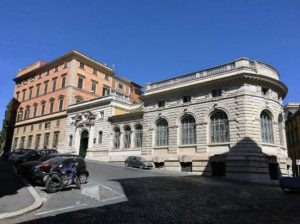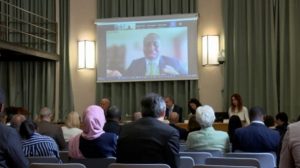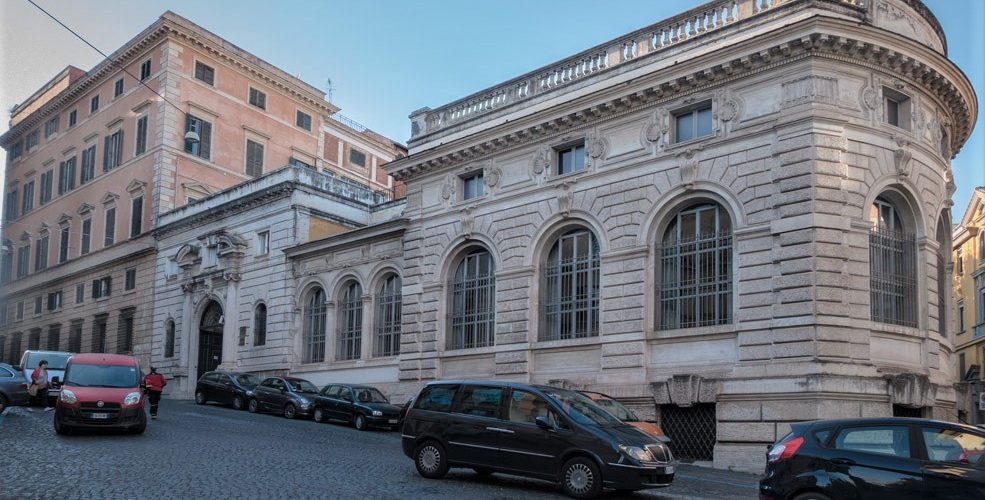Receive but also give, learn and at the same time teach, and in any case contribute to a common path that concerns everybody – this is the appeal of Makane Moise Mbengue, professor of international law at the University of Geneva. Professor Mbengue, who has Senegalese origins and a global vision, provided the keynote speech for the opening of the second edition of the International Programme for Law and Development (IPLD), a specialised training course which saw the participation of 22 jurists from 17 African countries this year. “We have to be ‘rulemakers’ and not only ‘ruletakers’”, Professor Mbengue declared via videocall from Geneva, disagreeing with any cooperation approach that is not reciprocal.
The participants attended the international Programme during the months of June and July; for three weeks, they covered various topics through dialogue and exchanges organised by UNIDROIT, which counts only four African countries among its current 65 Member States. According to Professor Mbengue, a greater number of Member States from among the sub-Saharan countries could lead to the development of more transparent and reliable legal systems, with positive impact on investments.

The seat of Unidroit in via Panisperna in Rome. © Unidroit
According to Marco Giungi, Head of the Unit for Global Multilateral Strategy for Development Cooperation of the Italian Ministry of Foreign Affairs and of International Cooperation, harmonising the legal framework helps “prevent problems” and “guarantees equity conditions and equality among the parties”. Ambassador Giungi also read a message from Vice-Minister Edmondo Cirielli, mentioning the “Mattei Plan” that the Italian Government intends to present during the fourth Italy-Africa Conference this autumn, and highlighting that whatever happens on the African continent has direct consequences in Europe and vice versa.
Another aspect underlined by several ambassadors among the 20 that were present at the IPLD opening ceremony was that of the impact of unified law on investment; indeed, “unification of international law is important especially for investments”, stated H.E. Naser Al Belooshi, Ambassador of the Kingdom of Bahrain in Italy. The courses of the International Programme for Law and Development are organised and coordinated by Marco Nicoli, supported by the Italian Ministry of Foreign Affairs and International Cooperation, and sponsored by the Italian Agency for Cooperation and Development (AICS).
Maria Chiara Malaguti, Professor of International Law at the Università Cattolica Sacro Cuore and President of UNIDROIT, clarified the IPLD’s objectives by saying, “we have selected Africa for a ‘master’ programme addressed not to young people that have just ended their studies, but to people that already perform in government administrations”. The participants first attended a two-week online session before coming to the seat of UNIDROIT for the three-week in-person module. President Malaguti continued: “We want to raise awareness on the African continent about the possibility to unify law by bringing legal instruments closer: the goal is not to make them all the same nor standardise them, but to modernise laws and make them more compatible and connected”. President Malaguti also touched upon innovation, startups, new technologies and rapid growth, emphasising that great inspiration was originating from Africa and international cooperation needed to provide possibilities for financing and implementation.

A session from the last class at Unidroit. © Vincenzo Giardina
Indeed, this is something that the participants agreed on. Devisha Vythelingum, a lawyer in Mauritius, noted: “Unfortunately my country is not yet a Unidroit Member State, but when I return to Port Louis I will try to share as much as possible of this experience to favour my country’s membership”. Mohamed Dielo, Vice-President of the High Court of Ouahigouya (Burkina Faso), added: “It is difficult to practice law because in some cases, national law is not precise”, but the Unidroit Principles, for example, “can be a useful point of reference”.
Justice Eduard Derek Wille, Permanent Judge of the High Court of South Africa, returned to Rome after having participated in last year’s first edition of the programme: “Our country has a magnificent constitution but, as we all know, the problem is the enforcement of it. Sections 232 and 233 of the Constitution allow, or rather require, judges to apply international principles in those areas that are not regulated by domestic legislation or where domestic legislation is insufficient”. In this way, Unidroit instruments are available to all. According to Wille, “other African countries, like Kenya, provide for this same possibility in their constitution”.
To sum up, Justice Wille stated the following: “My message to magistrates, lawyers, judges and drafters of legislative texts that have a hard time in their jobs, is that there are solutions: there is a bridge that allows you to overcome perilous waters, because the Unidroit Principles can be applied”.
Click here for article in Portuguese









 Professor Iacopo Donati is the UNIDROIT/Bank of Italy Chair Holder and is mainly responsible for assisting in the Bank Insolvency project. He is Professor of Corporate and Insolvency Law at the University of Siena, and coordinates the research project ‘Pro.Re.Ba.’ (Proportionating rules on bank crisis prevention and management to the case of retail banks), which has received funding from the Italian Ministry of University. He has previously taught corporate law at the University of Venice ‘Ca’ Foscari’, at the University of Florence and at the University of Rome ‘Tor Vergata’.
Professor Iacopo Donati is the UNIDROIT/Bank of Italy Chair Holder and is mainly responsible for assisting in the Bank Insolvency project. He is Professor of Corporate and Insolvency Law at the University of Siena, and coordinates the research project ‘Pro.Re.Ba.’ (Proportionating rules on bank crisis prevention and management to the case of retail banks), which has received funding from the Italian Ministry of University. He has previously taught corporate law at the University of Venice ‘Ca’ Foscari’, at the University of Florence and at the University of Rome ‘Tor Vergata’.
 rtered Institute of Arbitrators (London). He further holds a post-graduate diploma in law from the Kenya School of Law. Allan is also a scholar from the Hague Academy of International Law.
rtered Institute of Arbitrators (London). He further holds a post-graduate diploma in law from the Kenya School of Law. Allan is also a scholar from the Hague Academy of International Law.


 rofessor Ignacio Tirado was appointed Secretary-General by the Governing Council at its 97th session, and officially took office on 27 August 2018. A national of Spain, Professor Tirado (Commercial, Corporate and Insolvency Law, Universidad Autónoma of Madrid, Spain) holds a PhD from the Universities of Bologna and Autónoma de Madrid and an LLM from the University of London. Professor Tirado has been a Senior Legal Consultant at the World Bank’s Legal Vice-Presidency and Financial Sector Practice for more than nine years, having also consulted for the IMF on insolvency related matters as well as for the Asian Development Bank on commercial legal reform.
rofessor Ignacio Tirado was appointed Secretary-General by the Governing Council at its 97th session, and officially took office on 27 August 2018. A national of Spain, Professor Tirado (Commercial, Corporate and Insolvency Law, Universidad Autónoma of Madrid, Spain) holds a PhD from the Universities of Bologna and Autónoma de Madrid and an LLM from the University of London. Professor Tirado has been a Senior Legal Consultant at the World Bank’s Legal Vice-Presidency and Financial Sector Practice for more than nine years, having also consulted for the IMF on insolvency related matters as well as for the Asian Development Bank on commercial legal reform. A Swedish national, Ms Lena Peters grew up in Italy where she attended an English school. In 1978 she took her Juris Kandidatexamen at Stockholm University followed by a Master of Laws from King’s College, London (1979). Since 1985 she has been with UNIDROIT, first as Research Officer, lastly as Principal Legal Officer, her main duties being Secretary to the Working Group for the Preparation of Principles of International Commercial Contracts, Secretary to the Study Group on Franchising, Secretary to the Committee of Governmental Experts on Franchising.She also collaborated on the project for the preparation of the ELI-Unidroit Model European Rules of Civil Procedure. She is currently Managing Editor of the Uniform Law Review and responsible for publications at UNIDROIT.
A Swedish national, Ms Lena Peters grew up in Italy where she attended an English school. In 1978 she took her Juris Kandidatexamen at Stockholm University followed by a Master of Laws from King’s College, London (1979). Since 1985 she has been with UNIDROIT, first as Research Officer, lastly as Principal Legal Officer, her main duties being Secretary to the Working Group for the Preparation of Principles of International Commercial Contracts, Secretary to the Study Group on Franchising, Secretary to the Committee of Governmental Experts on Franchising.She also collaborated on the project for the preparation of the ELI-Unidroit Model European Rules of Civil Procedure. She is currently Managing Editor of the Uniform Law Review and responsible for publications at UNIDROIT. Marina Schneider is Principal Legal Officer and Treaty Depositary at UNIDROIT. She studied law at the University of Strasbourg (France) and Paris I – Panthéon Sorbonne. She joined the UNIDROIT in 1987 and was involved in the elaboration and French versions of most UNIDROIT instruments since. She is in charge of the 1995 UNIDROIT Convention on Stolen or Illegally Exported Cultural Objects and of the UNESCO-UNIDROIT Model Provisions on State Ownership of Undiscovered Cultural Objects. She is the author of the Explanatory Report of the 1995 Convention and many articles on the Convention and other international instruments in the field. Ms Schneider is also responsible for the project on private collections and for the UNIDROIT Convention Academic Project (UCAP). She is member of the Board of the International Society for Research on Art and Cultural Heritage Law (ISCHAL).
Marina Schneider is Principal Legal Officer and Treaty Depositary at UNIDROIT. She studied law at the University of Strasbourg (France) and Paris I – Panthéon Sorbonne. She joined the UNIDROIT in 1987 and was involved in the elaboration and French versions of most UNIDROIT instruments since. She is in charge of the 1995 UNIDROIT Convention on Stolen or Illegally Exported Cultural Objects and of the UNESCO-UNIDROIT Model Provisions on State Ownership of Undiscovered Cultural Objects. She is the author of the Explanatory Report of the 1995 Convention and many articles on the Convention and other international instruments in the field. Ms Schneider is also responsible for the project on private collections and for the UNIDROIT Convention Academic Project (UCAP). She is member of the Board of the International Society for Research on Art and Cultural Heritage Law (ISCHAL). Professor of Commercial Law, Carlos III University of Madrid. Currently, Sir Roy Goode Scholar at UNIDROIT, Rome, 2021-2022. Chair of Excellence 2017-2018 at University of Oxford (Uc3m- Santander Program), affiliated to Harris Manchester College. Previously Distinguished Visiting Professor and fellow of a number of Academic Institutions. Arbitrator of Madrid Court of Arbitration. Member of ELI (European Law Institute) Council and Executive Committee. Member of the Expert Group of the European Commission on Liability and New Technologies and member of the Expert Group of the European Observatory of Platform Economy; the International Academy of Commercial and Consumer Law; the expert group of the Inclusive Global Legal Innovation Platform for Online Dispute Resolution – UNCITRAL and Hong Kong Department of Justice. Expert of the UNIDROIT Study Group on the MAC Protocol of the Cape Town Convention on International Interests. Delegate of Spain to UNIDROIT for the adoption of the Protocol, delegate of Spain in Working Group VI of UNCITRAL on secured transactions and in Working Group IV on Electronic Commerce. Member of UNIDROIT Working Groups on Enforcement and Warehouse Receipts.
Professor of Commercial Law, Carlos III University of Madrid. Currently, Sir Roy Goode Scholar at UNIDROIT, Rome, 2021-2022. Chair of Excellence 2017-2018 at University of Oxford (Uc3m- Santander Program), affiliated to Harris Manchester College. Previously Distinguished Visiting Professor and fellow of a number of Academic Institutions. Arbitrator of Madrid Court of Arbitration. Member of ELI (European Law Institute) Council and Executive Committee. Member of the Expert Group of the European Commission on Liability and New Technologies and member of the Expert Group of the European Observatory of Platform Economy; the International Academy of Commercial and Consumer Law; the expert group of the Inclusive Global Legal Innovation Platform for Online Dispute Resolution – UNCITRAL and Hong Kong Department of Justice. Expert of the UNIDROIT Study Group on the MAC Protocol of the Cape Town Convention on International Interests. Delegate of Spain to UNIDROIT for the adoption of the Protocol, delegate of Spain in Working Group VI of UNCITRAL on secured transactions and in Working Group IV on Electronic Commerce. Member of UNIDROIT Working Groups on Enforcement and Warehouse Receipts. William Brydie-Watson is an Australian lawyer who specialises in secured transactions law and private international law. Before joining UNIDROIT, William was a government lawyer in the Private International Law and International Arbitration section of the Australian Attorney-General’s Department, where he worked primarily on treaty negotiation and the implementation of private international law treaties in Australia. At UNIDROIT, he is primarily responsible for the implementation of the Mining, Agriculture and Construction (MAC Protocol) to the 2001 Cape Town Convention on International Interests in Mobile Equipment and the development of a Model Law on Factoring. William also serves as UNIDROIT’s liaison with the Asia Pacific Economic Cooperation (APEC) forum and as manager of the Institute’s Scholarship and Internship Programme. Admitted to practice in New South Wales and the High Court of Australia, he has a Bachelor of Arts (honours), a Bachelor of Laws and a Master of Laws from the Australian National University. William also lectures on International Secured Transactions Law at the Eotvos Lorand Faculty of Law in Budapest.
William Brydie-Watson is an Australian lawyer who specialises in secured transactions law and private international law. Before joining UNIDROIT, William was a government lawyer in the Private International Law and International Arbitration section of the Australian Attorney-General’s Department, where he worked primarily on treaty negotiation and the implementation of private international law treaties in Australia. At UNIDROIT, he is primarily responsible for the implementation of the Mining, Agriculture and Construction (MAC Protocol) to the 2001 Cape Town Convention on International Interests in Mobile Equipment and the development of a Model Law on Factoring. William also serves as UNIDROIT’s liaison with the Asia Pacific Economic Cooperation (APEC) forum and as manager of the Institute’s Scholarship and Internship Programme. Admitted to practice in New South Wales and the High Court of Australia, he has a Bachelor of Arts (honours), a Bachelor of Laws and a Master of Laws from the Australian National University. William also lectures on International Secured Transactions Law at the Eotvos Lorand Faculty of Law in Budapest.